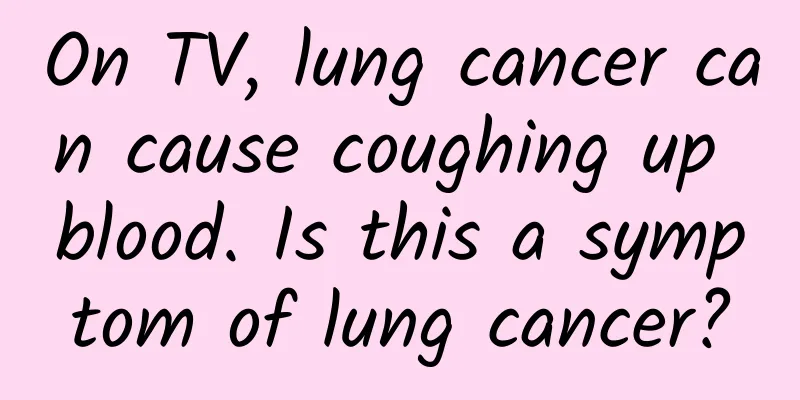On TV, lung cancer can cause coughing up blood. Is this a symptom of lung cancer?

|
We often see such scenes on TV: lung cancer patients cough, spread their hands covering their mouths and noses, and the white handkerchief is covered with red bloody sputum, and then the patient soon passes away. Indeed, this situation reflects the symptoms of lung cancer to a certain extent. When lung cancer patients cough, blood in the sputum or hemoptysis is a common symptom, especially in middle and late stage lung cancer. However, does hemoptysis mean that you have lung cancer? Does hemoptysis from lung cancer mean that you will not live long? #What is hemoptysis? What diseases can cause hemoptysis? Hemoptysis refers to bleeding from any part of the respiratory tract below the larynx, which is discharged through the mouth. The symptoms vary depending on the amount of bleeding. A small amount of hemoptysis often manifests as blood in the sputum; when there is a large amount of hemoptysis (>500ml within 24 hours, or >100ml of hemoptysis per time), it is the scene we often see on TV dramas: red bloody sputum. Of course, hemoptysis is not exclusive to lung cancer. Many benign diseases can also cause hemoptysis, such as: (1) Respiratory system diseases: pulmonary tuberculosis, bronchiectasis, lung abscess, pulmonary fungal infection, pulmonary parasitic disease, pulmonary embolism, etc. (2) Circulatory system diseases: pulmonary congestion, mitral stenosis, essential hypertension caused by acute left heart failure, congenital heart disease, etc. (3) Blood system diseases: idiopathic thrombocytopenic purpura, acute leukemia, hemophilia, etc., usually accompanied by bleeding in other parts of the body in addition to hemoptysis. In addition, when the esophagus and stomach bleed, what is discharged from the mouth is "vomiting blood", which should be distinguished from hemoptysis. There is also blood in the sputum caused by bleeding gums, which should also be distinguished. #Which types of hemoptysis should alert you to lung cancer? The high-risk population for lung cancer is defined as those aged 40 to 80 years old and with at least one of the following risk factors: (1) Cumulative smoking index ≥ 20 packs/year; (2) Environmental or occupational exposure (such as radon, silicon, cadmium, arsenic, beryllium, chromium, nickel, asbestos, diesel fumes, soot, radioactive elements, etc.); (3) Family history of lung cancer in first-degree relatives; (4) Combined with chronic obstructive pulmonary disease, diffuse pulmonary fibrosis or old tuberculosis; (5) History of malignant tumor; (6) Long-term inhalation of secondhand smoke or long-term exposure to kitchen fumes. If you belong to a high-risk group and have hemoptysis, you should be highly vigilant. If in addition to hemoptysis, you also have an irritating dry cough, hoarseness, unexplained fever, weight loss, etc., you should be even more vigilant and seek medical attention in time. The methods for lung cancer screening mainly include sputum cytology, chest CT and electronic bronchoscopy to identify the lesions. #Does coughing up blood from lung cancer mean you won’t live long? In patients with lung cancer, especially central lung cancer, tumor cells invade the bronchial mucosa, causing increased capillary permeability, blood oozing, and even direct damage to the subbronchial mucosal blood vessels. When the patient coughs, the blood vessels rupture and bleed, or the accumulated blood is discharged with sputum, which is hemoptysis. At this time, the first thing to do is to perform appropriate hemostatic treatment according to the bleeding situation. However, hemoptysis does not equal advanced lung cancer, especially small amounts of hemoptysis (manifested as blood in sputum) is often not advanced lung cancer. With timely medical treatment, early diagnosis and early treatment, a considerable number of lung cancer patients can be cured through comprehensive anti-tumor treatments such as immunotherapy, chemotherapy, and radiotherapy. Therefore, the onset of hemoptysis in lung cancer does not mean that the patient will not live long. Early diagnosis and treatment are the key. In short, coughing up blood does not necessarily mean that you have lung cancer, and not all lung cancer patients will cough up blood. When symptoms of coughing up blood occur, early medical treatment, early diagnosis and early treatment can change the plot in TV dramas that "lung cancer coughing up blood will lead to death soon." |
<<: What are the side effects of targeted therapy? How to prevent them?
Recommend
How to relieve menstrual stomach pain
I believe many female friends have experienced lo...
Causes of itchy breasts during pregnancy
The physical condition of pregnant women is relat...
Girls' growth and development standard chart
Girls' growth and development generally occur...
What are the treatments for female sexual indifference?
Sexual indifference is an important factor that d...
What causes brown menstrual period?
Women should pay attention to their menstrual hea...
What can a female dog eat after giving birth to puppies? How long should a female dog be sterilized?
Dogs are just like humans. After giving birth to ...
Is vulvar dystrophy the same as vulvar leukoplakia?
Many female friends cannot distinguish between vu...
Why is there still a little period on the eighth day?
Basically all women will experience some menstrua...
Fish, nuts and beans are good for your heart! Spanish study
How good would it be to eat more fish and plant f...
So embarrassing! Women spray out this filthy stuff during menstruation
Girls always have a lot of problems during their ...
What does it mean to dream about combing your hair and losing hair?
As everyone is getting busier and busier at work,...
Can I drink Tremella and Red Dates Soup during my menstrual period?
It is said that there are many benefits for women...
Why do I have stomach pain when I am pregnant?
The social environment is very bad now. There are...
What is the meaning of putting coins in dumplings during the Spring Festival? Why do people put coins in dumplings during the Spring Festival?
We all know that during the Spring Festival every...
Reasons for delayed menstruation after vasectomy
We all know that in life, if a couple has sexual ...









